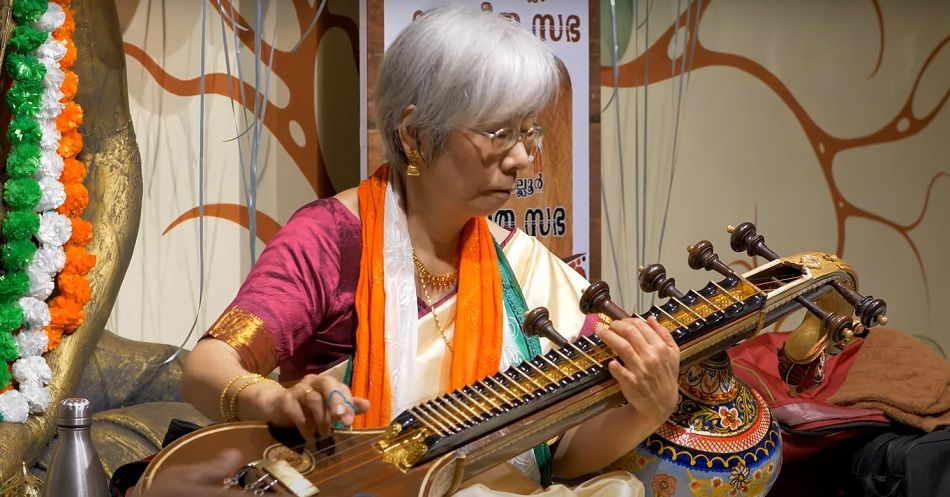For Yuko Matoba, the first acclaimed Veena artist from Japan, Carnatic music is a deep-rooted passion and realisation.
For musicians from abroad, Carnatic is a hard nut to crack. Non-Indians face huge challenges while learning and practising Carnatic music, right from learning the lyrics to mastering the gamaka system and the intricate tala structure. Still, Japanese artist Yuko Matoba has successfully mastered the South Indian stream of music and its intrinsic ways to become the flagbearer of Carnatic in Japan. For more than four decades now Matoba has been performing at venues across the globe. She is the only internationally acclaimed Veena player from the land of the Rising Sun. Hailing from Tokyo, the 70-year-old Veena artist says she fell in love with the art form during her stint at the Department of Musicology, Tokyo University of the Arts, in her early 20s.
That was in the 1970s. Matoba, a musicology student at the Tokyo University of Arts, did her research in Indian music under the guidance of Fumio Koizumi, an ethnomusicologist, who introduced Indian music in Japan. “He asked me to visit India to learn Indian music,” says Matoba. “I joined the Government Music College, Chennai and learned Veena from gurus Rajalakshmi Narayanan, Kalpakam Swaminathan, M Nageswara Rao, M Sarada and N Vijayalakshmi,” adds Matoba whose favourite ragas are Kalyani, Todi, Abheri, Saramati, Bhairavi and Subhapantuvarali.
Under N Govindarajan, Matoba learned Mridangam as well. Sahitya is important in Carnatic, says Matoba. To play with the bhava, one has to know the meaning of lyrics and the context of the text. “While I learn, I ask my teachers for the word by word meaning of the lyrics.” Playing the Veena without knowing the meaning of the krithi is pointless, she says. The phrase is connected with Sahitya, “so I have to know it. My gurus taught me not only the music but also a view of life,” says Matoba who has played many Veena concerts in India.
Japanese-Indian connect
Carnatic music is a complete art form, says Matoba. Learning Carnatic was very challenging for her as learning melody was not an easy task to master, especially for an ‘outsider’. Yuko says it was not very easy to master the techniques of the Veena, but the most difficult part for her was to understand Indian music and reproduce the melody. Speaking about the similarities between the cultures of Japan and India and how they reflect on the music, Matoba says that “in both Japanese and Indian music, tunes are detailed and decorative. We also had the gurukula system during the olden days. We also worship Hindu Gods who came along with Buddhism. In fact, there are many Sarasvati temples in Japan,” she says.
The Japanese Buddhist goddess, Benzaiten, who is Japan’s reply to Saraswati, holds biwa, a traditional Japanese lute, just as Saraswati holds a veena. Biwa, a string instrument with four strings is close to the Veena. How do Japanese audiences respond to Indian music? Matoba explains: “When I do a Veena concert in Japan, I begin with an explanation on the Carnatic music system and translate the Sahitya into Japanese. To know the meaning of the song is important.
Deep learning
“Carnatic music is grand and deep,” says Matoba who has authored several research papers on Indian music. Her research paper ‘Flexibility in Karnatic Music: A Comparative Analysis of Mahā Ganapatim’ explores how variability, change and flexibility play out in Indian music. She explains how they interact concretely within the music and the way the music of ancient cultures could be studied empirically rather than speculatively.
Her other papers include ‘Musical Aspects of Baul Music’, ‘Present-day use of Ragas in South Indian Classical Music’ and ‘Rhythmic Pattern Arrangement in South Indian Classical Music Improvisation.’“I’m so fascinated with Carnatic music now; I cannot live without it,” says Matoba who was a college teacher in Japan. Every year, during the summer holidays, she visits India and learns new kritis. Back home, Matoba teaches Veena to a few Japanese and Indian students. She also conducts Veena concerts and lecture-demonstration in Japan. “My family always supports and encourages me,” says Matoba, mother to two daughters.

